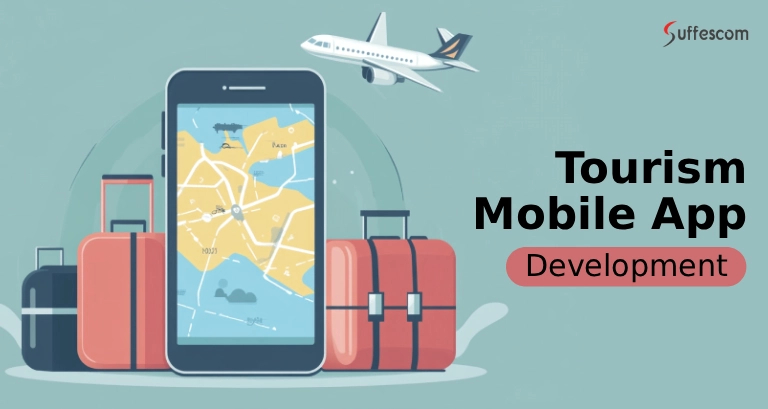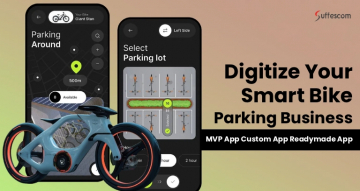Next-Gen Tourism Mobile App Development for Streamlined Travel Planning

Today, smartphones have transformed how people search, book, and experience travel. The tourism market is anticipated to be $1.39 trillion by 2030, along with the user penetration rate expected to reach 33.33%. Travelers nowadays need instant services along with the ease of personalization, which is possible with tourism mobile applications.
Developing feature-rich tourism applications offers significant benefits for travelers, elevating the traveling experience to new heights. As worldwide tourism advances and grows, the demand for easy-to-use, feature-rich user applications has increased with travel plans such as itinerary management, multi-language translation services, augmented reality navigation systems, digital payment services, and others providing additional support.
What is a Tourism Mobile App and How Does it Work?
A tourism mobile app improves the traveling experience by offering travelers the tools and services that enhance the travel experience. All of the tasks related to fulfilling the travelers' needs, planning and booking their trips, are done through the app.
Working Process
- The app provides deeper insights about the popular destinations, such as images, reviews, etc.
- The user makes bookings and reservations to their favorite attraction.
- The in-app navigation helps travelers navigate through different cities and provides them with different public transport options.
- This travel itinerary is provided to the travelers based on the user data. They can also share the journey with friends and family via social sharing options.
Leverage top-notch travel app development services and build an exceptional platform that will keep you ahead of the curve.
Travel and Tourism App Development Services: One-Stop Shop For Diverse Business Needs
1. Tour Operators
Tourism mobile app development helps tour operators improve efficiency in creating, managing and booking packages. The features include itinerary builders, dynamic group bookings, guide availability, real-time schedule updates, and modular pricing, creating seamless travel experiences.
2. OTAs
The goal is to build a seamless user experience, featuring fast searching and filtering tools, real-time availability collection, securely processed payments, and push notifications. The AI-powered personalized options, support for multiple languages, and integrated reviews. Online travel agencies generate engagement, customer loyalty, and revenue via upselling and personalized offers obtained via existing APIs.
3. Cruise Tour Companies
Cruise tour companies enjoy a list of features that include real-time excursion listings based on the ship's current location, categorisation by interest or activity level, booking capabilities, and itinerary integration. Tourism mobile Apps augment the cruise experience by taking the comfort of a cruise ship and interweaving the off-ship excursions experience into one booking process.
4. Corporate Travel Management Companies
The mobile applications specific to the corporate clients incorporate booking workflows enabling booking compliance with policy, expense functionality, itinerary overview, emergency assistance, travel reporting dashboards and multi-channel functionality (air, hotel, car) to maintain and manage time, safety and cost.
5. Destination Management Companies
With a DMC-centric application, clients, be it event planners or visitors can browse curated packages, book local services, schedule conference or incentive programs, contact multi-lingual support, and receive preferential pricing through supplier networks. This app digitizes and simplifies the delivery of customized location-based experiences.
Want to Build a Tourism Mobile App for Your Business?
Key Features of Tourism Mobile App Enhancing Convenience
1. Trip Itinerary Planner
Enables users to plan their trip one day at a time with various components including flights, hotels, activities, and transportation options. The app covers drag-and-drop style itinerary planners and suggestions that assist users in building a customized and efficient travel itinerary.
2. Navigation
Helps the users to stay on track with GPS integration and an offline facility offering navigation and location-based services. Navigation features show turn-by-turn navigation, estimated time of travel, and points of interest to increase safety and ease of travel.
3. Hotel and Flight Booking
Tourism apps offer a booking engine that enables users to conduct price comparisons and book a flight, hotel, rental car, or tour directly within the app. The connection with external third-party services offers a recommended booking engine and filters based on reviews, prices, and other factors.
4. Report Generation
Supports managers or admins in creating and exporting structured insights into different areas of the business, including booking trends, user activity, reviews, revenue details and itinerary summary information. This feature captures data taken from the linked databases and automatically generates a report.
5. Third-Party API Integrations
Allows smooth communication while exchanging data between the app and other external service providers. It helps with access to real-time information on prices, flight schedule, availability, etc and simplifies the booking experience.
6. Ticketing System
Facilitates operations related to flights, buses, trains, accommodations, and attractions. It automates the reservation process by automating reservations, seat selection, payment, confirmation, and issuance of electronic tickets.
7. Language Translation
Tourism applications offer a real-time translation service, whether that would be text, voice, or even images (i.e., signboards of menus). This feature is essential to a traveler in a non-English-speaking country, as it can provide ease of communication while also providing for cultural significance.
8. Currency Converter
Help the user with an immediate understanding of exchange during their travels. By using a budget tracker, a traveler can keep track of spending and help visualize spending limits for their travel budget. This function is especially useful in a situation where you are going to another country and there are multiple currencies involved.
9. Emergency Support
Constantly sends alerts about natural disasters, safety advisories to the users, and suggests safe routes. The users are also able to send distress signals through the SOS button in case of any emergency.
10. Feedback Feature
Travellers are able to utilize reviews and ratings to help them make informed decisions while planning their itineraries for booking and visiting, and it helps service providers to improve the quality of their service which leads to greater user satisfaction, and builds trust.
11. Push Notifications
Push notifications are representations of communication. These provide timely updates for user-travelers, including new flight delays, weather alerts, local events, and travel offers. Timely alerts enhance the traveler's experience based on being able to access information easily and make decisions quickly.
How to Create a Tourism Mobile App?
1. Ideation: Identify the purpose of the app, target users, and main features so that we can resolve certain travelers' pain points.
2. Market Research: Study competitors and user feedback to see where the opportunities and the gaps exist in the market.
3. UI/UX Design: Wireframes and prototypes are created that focus on building intuitive interfaces and visually appealing elements.
4. Development: Front end and back end, with the features we want, like booking systems and credit card payments.
5. Testing: Test the app on the number of devices agreed upon to make sure it works as designed and performs as expected.
6. Deployment: Publish the app on the desired app stores , following platform guidelines and following the best practices to optimize search visibility.
7. Maintenance and Upgrades: Over time, upgrade, fix, and improve the app with new features based on user feedback.
Top Travel and Tourism App Development Solutions Enhancing Customer Experience
1. Tour Reservation Platform
Allow users to explore, filter and book tours on a mobile device. It includes real-time availability checking, secure payment integration, tour listings, user profile, booking confirmation, rebooking, loyalty or referral programs.
2. CRM Solutions
The CRM modules allow travel companies to keep track of customer profiles, preferences, inquiries, activity history, etc. CRM tools specific to the travel and tourism sector provide the ability to create itineraries, manage leads, report and track bookings, etc.
3. Automated Booking Systems
Automates the whole reservation workflow like availability, confirmation, and reporting. This also means dynamically generated pricing, updating availability, notifying clients, accounting or marketing systems using third-party automation tools.
4. Rental Management Portal
Includes availability management, reservation schedule, maintenance alerts, payments, dynamic pricing, multi-channel syncing, and reporting features. Custom platforms for hotels or rental properties can integrate with platforms like Airbnb, helping to improve operational efficiency.
5. Transportation Information App
Provides real-time tools for travelers that may include route planning, schedules, booking features, and tracking for buses, trains, and flights. It includes interactive seat maps, operator networks, real-time updates, multi-modal transport integration etc.
Advanced Features Tourism Mobile App That Adds Business Value
1. AR City Tours & Site Exploration
AI has the power to bring our historic sites back to life and tell their stories more vividly than ever before. An advanced AI travel application gives users a virtual experience of their tour hotels and resorts. Thus, instilling a sense of booking confidence and lowering cancellation rates.
2. AI-Powered Smart Itinerary Builders
These builders dynamically change the itinerary in accordance with user behavior, local weather, and attraction states.
3. Voice Support
With voice-based recognition and real-time translators, the app allows for easy travel abroad, along with access to a worldwide user base.
4. Payment Gateways
Offers diverse payment options to users, including credit/debit, cryptocurrencies, and digital wallets. It ensures a hassle-free experience and offers security like two-factor authentication and encryption.
5. Crowd Forecasting
With this feature, travelers can determine the crowd density at a particular site, ensuring a comfortable journey. It helps streamline the entire travelling process, delivering the utmost personalized and secure experience.
Technology Stacks We Use in Travel & Tourism App Development
The following technologies have been chosen to build a scalable and robust tourism app.
| Category | Technology |
| Frontend | - Flutter, React Native |
| Backend | - NodeJS with NestJS - Java with Spring Boot (for scalable microservices) - Python (for AI-related services) |
| Database | - PostgreSQL - Redis -MongoDB |
| Cloud | -AWS, Google Cloud, or Azure - CDN environmental coverage |
| DevOps | - Docker - Kubernetes - GitHub Actions |
| Security | - OAuth 2.0 - JWT tokens - AES-256 |
| AI/ML | - TensorFlow - Amazon Personalize - NLP |
| AR/VR | - ARKit and ARCore - Vuforia |
Popular Tourism Across Business Regions
1. Saudi Arabia
The country marks the original number of 100 million visitors from both domestic and international, to have been surpassed well ahead of schedule; hence, Saudi Arabia has ambitiously revised its number to 150 million visitors by 2030. The market also gravitates toward religious tourism, adventure tourism (specifically desert safaris), and heritage tourism.
2. United States
US-based firms are at the forefront of app monetization and user engagement, earning upwards of $430 million a year in travel app revenue. In itinerary programming and AI-powered recommendation, multi-service bundling, and more, Airbnb and Expedia are setting the pace.
3. Singapore
The city and state of Singapore account for the top slot in connected urban mobility, while already offering digital concierge services that seamlessly join ride-hailing, public transit, hotel bookings, and local attractions, creating a smooth experience for over 19 million annual visitors.
4. Thailand
Mobile-first travel, the mobile percentage stands at 89% of bookings in Thailand. Regional players like Traveloka and Agoda optimize ubiquitous payment (PromptPay) methods for both local and international tourists.
5. France and Spain (Europe)
Western Europe is known for open-data initiatives like France’s DataTourisme, supporting hyper-localized app content. Spanish startups invest in travel tech accelerators and scalable cloud solutions.
6. Malaysia
Malaysia's travel ecosystem stands out for super-apps like Grab and AirAsia Move, which combine transportation, lodging, and local commerce. The application provides both locals and tourists with convenient transportation alternatives, including food delivery.
7. Bangkok
As a key Southeast Asian hub, Bangkok invests in AR/VR pilots for local attractions and supports government-partnered “smart city” tourism app rollouts. Popular apps like Eatigo and TripAdvisor provide recommendations about restaurants, and apps like Moovit help tourists navigate the public transport network, such as buses, ferries, etc.
8. Turkey
In Turkey, digital transformation is rapid, with apps like Museums of Türkiye and MARTI providing rich cultural experiences and smart mobility. GetYourGuide and Viator are the most popular travel and tourism apps used in Turkey that help book hot air balloon rides or guided walking tours of ancient ruins.
Drive Business Growth with Tourism Mobile App Solutions!
Top Five Tourism Apps Existing Worldwide
1. Nusuk
Nusuk offers an all-in-one platform for travelers to Saudi Arabia, furnishing smooth bookings for Umrah pilgrimages, heritage sites tours, and in-app AR navigation within Mecca and Medina. Nusuk, one of the major app choices, allows travelers to apply for visas, book accommodations, and experience life inside the kingdom. AR city guides and e-ticketing are becoming more popular, enabling tourists to move about seamlessly.
2. Viator
One of the popular tourism apps that offers guided tours to travelers around a particular location. The app provides a convenient booking system with smooth confirmation and checkout processes. Formerly founded in Australia, it was later acquired by US-based TripAdvisor. From local city tours to museum passes, Viator provides ample options for adventure sports.
3. TripIt
US-based app- TripIt organizes all of a traveler’s plans in one place by allowing users to keep track of flights, hotels, car rentals, and more. TripIt will automatically input details from your confirmation emails and create a clear and easy to read schedule, and will allow you to keep it offline. In particular, this app is beneficial for business travelers with multiple trips.
4. TripAdvisor
TripAdvisor is likely the most recognized tourism app on the market, as it provides all of the features from recommendations to booking accommodations. The app provides "Trips" tools for saving the places users are really interested in, as well as itinerary building and managing travel plans.
5. Visit A City
Last but not least, the application is popular in Paris & France, which features personalized itineraries for over 1,000 cities around the world. The app has guides, recommended attractions, offline maps, and suggested routes to see the sites. The app also includes estimated visit times to help you organize your day.
How Much Does it Cost to Build a Tourism Mobile App?
The tourism mobile app development cost ranges between $8000-$25000. The price is subject to variation depending upon various factors illustrated as under;
1. App Complexity
The app with basic features will cost less than the ones with advanced features.
| App Complexity | Development Cost |
| Basic App | $8000-$12000 |
| Advanced App | >$12000 |
2. Design
UI/UX design plays a crucial role in customer engagement. The custom designs and animation attributes, easy navigable interfaces supported with visually appealing elements greatly impacts the budget.
3. Platform Type
Creating tourism apps for iOS and Android separately will definitely cost more than a cross-platform solution. The native one uses different codebases, whereas the cross-platform ones use a single codebase, making an impact on the development time and cost.
4. Third-party Integration
The third party API integrations ensure feature integration, handle updates, offer maintenance services, access to pre-built functionalities, influencing the development cost.
Why Should Businesses Invest in Tourism Mobile App Development?
1. Amplified Customer Engagement
A well-designed tourism mobile app drives users to use it over and over through push notifications, deals, and event updates. It helps build brand loyalty, and keeps the traveler engaged well after their trip by providing after trip services such as feedback.
2. Competitive Advantage
Having an app provides a competitive advantage to companies that are not yet offering a mobile solution. As customers look for ways to collect information and/or buy products, they will increasingly expect digital solutions, and an app can modernize the travel experience and place your store "in the know" regarding current customer expectations.
3. Revenue Generation Opportunities
Apps can provide capabilities such as in-app booking, payment processing, marketing for affiliate organizations, and promotions for local businesses. Even including premium features, exclusive content, or exclusive deals can start to generate revenue.
4. Brand Recognition & Trust
A user-friendly app will help build brand credibility and create new users, which will help build trust in your brand and long-lasting relationships with the customers. Investing in a tourism app raises business visibility and caters to the growing expectation for convenience in the travel industry.
5. Better Customer Experience
The tourism mobile app provides streamlined convenience with navigation, access to instant information, and recommendations based on your likes/ dislikes. Moreover, it also provides updated travel updates, concerning weather updates, and local events.
How Does a Tourism Mobile App Makes Money?
1. Paid Listings
The local businesses like hotels, restaurants, and other tourist attractions are charged specific fees to get listed on the platform, making them visible to the wider customer base.
2. Affiliate Marketing
Collaborating with the travel companies while promoting their services in exchange for commissions on sales or leads also helps in generating money.
3. In-App Purchases
Access to exclusive services like travel guides and itinerary planner tools within the app, known as a one-time purchase, leads to revenue generation.
4. Data Monetization
The platform owners can sell the anonymized data to different enterprises like research and marketing firms, helping them understand user behaviour, in exchange for which they can earn money.
5. Advertisement
The app owners can sell a digital space to display relevant ads on their platform, for which they charge ample money.
Hire Travel and Tourism App Development Solutions
Why Choose Us as a Tourism Mobile App Development Partner?
Suffescom is a leading mobile app development company in USA that has expertise in delivering innovative and user-centric solutions. Our team has deep expertise in understanding the needs and crafting customized apps that resonate with businesses and travelers alike.
Our talented professionals focus on building intuitive user interfaces, serving optimized performance and seamless navigation, making the app stand out in the market. We focus on developing scalable and robust applications, updated with the latest functionalities, driving business growth.
People Also Search For
1. Where can I get a Tourism App From?
You can get a high-tech tourism app from reliable mobile app development companies that create custom solutions across the travel and tourism sector. Suffescom is one such name in the industry that has helped businesses realize their dream goals.
2. Is White Label Tourism App Profitable?
Yes, white label tourism app is quite profitable, specifically for businesses that want a quick market launch at a low initial cost.
3. What Is The Cost of a Custom and White label Tourism App?
The custom tourism app development cost ranges from $ 8,000-$ 25,000; whereas the white label tourism app cost ranges from $ 5,000-$15,000.
4. Which is The Best Tourism App Development Company?
Suffescom is the best tourism app development company due to its diverse portfolio, satisfactory client reviews, and expertise in emerging technologies.
5. From where can I get a Customized Tourism Prototype?
A customized tourism prototype can be acquired from a trustworthy development agency that has a proven track record of creating interactive prototypes. For that, you need to perform intense research, check their experience, and verify their testimonials.
6. Why is the Tourism Planning App Popular?
Tourism planning apps are popular as they simplify the traveling experience with curated itineraries, navigation, and booking options all in the same platform.
7. How Can I Integrate AI into My Tourism Business App?
AI can be integrated within the tourism mobile app through voice recognition functionality, chatbots that offer non-stop customer assistance, predictive analytics, visual search, etc. All this is achieved by partnering with a leading AI development company with experience in leveraging cutting-edge technologies.







